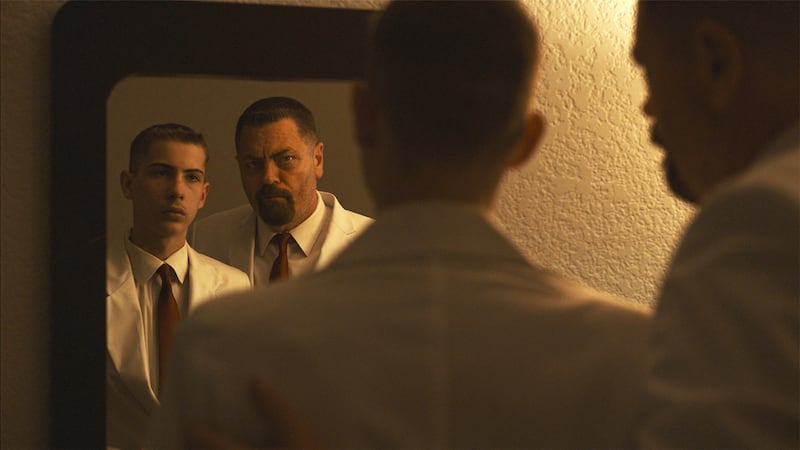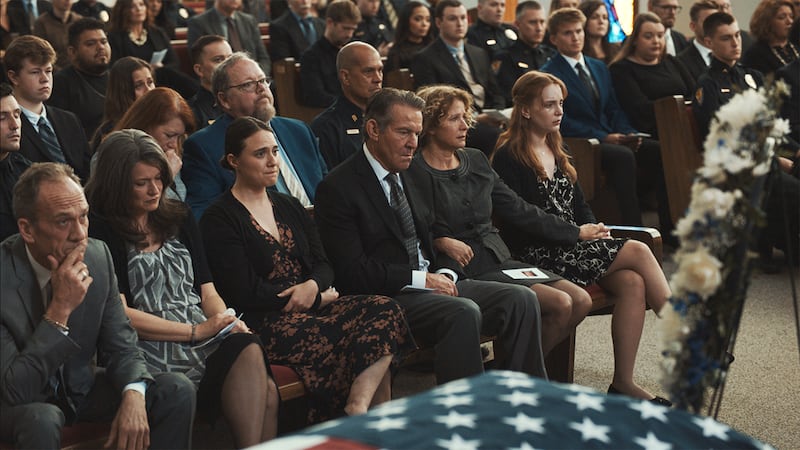There’s a fundamental loneliness nestled at the root of America’s far-right extremist movements. Whether it be QAnon or the manosphere, acolytes of these groups share a complete lack of faith in the society that has molded them.
That kind of paranoia, coupled with untenable hyperindividualism, too often leads to devastating bursts of violence. The specter of such a tragedy looms over Sovereign, writer-director Christian Swegal’s underbaked new crime thriller, in theaters and on VOD July 11.
The film opens in media res, as frantic police radio chatter teases that our characters are headed toward an explosion of gunfire. While it doesn’t reveal the exact details right off the bat, a cursory Google search will tell you that this story is based on real-life father-son duo Jerry and Joe Kane, who were involved in a deadly Arkansas shoot-out back in 2010.
The fact that the average viewer likely hasn’t heard of the Kanes outside of this movie is a testament to our country’s endless cycle of gun deaths. Still, it becomes far more difficult to invest in Jerry and Joe’s plight when they’re no longer ripped-from-the-headlines figures, but thinly sketched protagonists.

Nick Offerman became a household name for playing anti-government libertarian Ron Swanson in Parks and Recreation, a role that haunts his portrayal of Jerry. Once an ordinary Middle-American roofer, his personal desperation following the loss of his wife and infant daughter — whom the state conducted an autopsy on against his wishes — has radicalized him. Now, Jerry is a staunch member of the sovereign citizen movement, a disparate string of conspiracists who believe they’ve denounced their citizenship and are no longer beholden to the U.S. government.
He and his teenage son Joe (a remarkably grown-up Jacob Tremblay) technically still call their derelict Arkansas house a home. Yet when Jerry isn’t protesting its imminent foreclosure, they’re a pair of 21st century nomads.
Cinematographer Dustin Lane draws out the palette of the dreary Midwestern winterscapes that the Kanes traverse, letting its loopy gray interstates and dim beige motel rooms seep into every static frame. Outside of a budding connection with one of his fans (Lesley, played with welcome warmth by Martha Plimpton), Joe is all Jerry has left outside of giving impassioned sovereign sermons to down-on-their-luck folks even more vulnerable than he is.

Tremblay — who first shot to stardom playing another isolated child in Room —plays Joe with a detached melancholy befitting a kid who’s spent his childhood as his father’s sole tether to reality. As much as he instinctively seeks Jerry’s approval, his quiet fixation on the cute neighbor girl and persistent desire to ditch home-schooling for the nearest high school betray his eagerness to soak up the world from which he’s been hidden.
Offerman’s turn here is most clearly reminiscent of his sitcom past, but lacking the gruff warmth that Ron had in spades. Here, he convincingly hints at the raw wellspring of pain lurking just beneath Jerry’s often-explosive exterior.
Rather than stopping at one real-life strained parent-child relationship, Swegal takes pains to introduce another in the form of surly cop John (Dennis Quaid), whose son Adam (Thomas Mann) has just graduated from the police academy. A boomer dad stereotype to the extreme, John is far more comfortable on patrol than he is bonding with his own family — after all, he spends what little time we see of him off-duty grousing at his son to stop comforting his own infant when he cries (seriously, who describes their colicky grandson as a problem?!).
His character’s black-and-white view of the world was clearly invented to serve as a law-and-order foil to Jerry’s lawless one. While Swegal thankfully doesn’t write John as walking, faultless copaganda, his presence — and his unconvincing connection to Jerry — merely highlights the pitfalls of Sovereign’s apolitical approach.
Ultimately, the film never quite figures out how to let Jerry and Joe exist outside of their own situational misery. Their isolation is the point, but given how colorless and languidly paced Sovereign is, the experience of watching it quickly starts to feel punishing rather than incisive.
Actually commenting on the real-world politics behind America’s tendency to bleed its citizens dry without offering them any meaningful safety net could have at the very least sparked meaningful conversations between the movie’s audience. Instead, Swegal lands on a both-sides approach that, eruptive conclusion aside, never makes the tragedy of the Kane family anything more than skin-deep.









